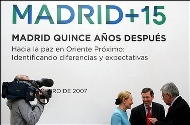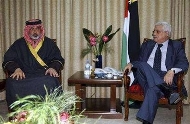Since its creation in 1948, Israel has been governed by the logic of power. Its territorial expansion, political influence, and, most notably, blatant violation of international law have been almost conveniently sustained by the perception that its military capability is far too advanced for any regional challenge. Its imposed existence in the Middle East, at the expense of the Arab World (particularly the Palestinians), has been safeguarded not only by its strategic and political alliance with the US, but more significantly on the basis that its military forces and power of defence are invincible.
This analogy was put to the test on 12 July 2006, when the HizbAllah movement arrested 2 Israeli soldiers on Lebanese sovereign territory and gave Israel the option to negotiate their release in exchange for Lebanese political prisoners in Israeli jails. It was put to the test when Israel arrogantly opted to neglect the option of diplomacy and launched a full scale assault against Lebanon (not just HizbAllah). It was put to the test when Israel decided to respond with sheer force against Lebanese civilians; with massacres; with its familiar short-sighted policies of militarism and brutality.
What has Israel achieved in its war of aggression against Lebanon? Absolutely nothing!
Israel has, at best, misled its own citizens into obediently accepting the logic of power once again, and placed them at the risk of HizbAallah’s surprisingly powerful offensive capability. It has caused chaos in its own towns and cities by opting for war, thereby paralysing its false sense of security and stability.
Thousands of HizbAallah rockets have landed into Israel, and even more humiliating, repeated attempts by Israeli ground troops to infiltrate and re-occupy southern Lebanon’s villages and towns (HizbAallah’s stronghold) have failed, leaving dozens of Israeli families with the shattering images of their sons, fathers, brothers, and friends in body bags.
It is, therefore, no surprise that Israeli Foreign Minister Tzipi Levni rushed to endorse the vague UN Resolution 1701 as “compatible with Israeli national interests.” Basically, anything which gets Israel out of this mess is “compatible with Israeli national interests!” What other options does Israel have? 1701 is Israel’s face-saving resolution.
The continuation of military assaults against Lebanon will not deter HizbAllah. In fact, in light of what we have witnessed during the past month, Israel’s war against Lebanon has not only increased Hassan Nasrallah’s popularity among most Lebanese nationals, but throughout the Arab and Islamic World. Lets face it, the man is charismatic, honest, and able/willing to practice what he preaches (a scarce quality among Arab leaders in this day and age).
On the other hand, what Olmert and Co. seem to have miscalculated, in addition to HizbAllah’s determination and power, is their own ability to deliver. As it unravelled, Israel’s war against Lebanon highlighted the weaknesses of Sharon’s Kadima generation of unilateralists. It has shaken the foundations of Israel’s political and military establishments, let alone of Israel itself.
Meanwhile, as the Israeli leadership breathes sighs of relief on day 1 of the “cessation of hostilities,” it may be essential that it reconsiders Israel’s long term options: at what expense is Israel willing and able to sustain its illegal occupation of the Palestinian territories? Has the time come for a comprehensive solution to the Arab-Israeli conflict, on the basis of security, legality, and justice? After all, the simmering Arab and Muslim populace is clearly behind the option of resistance; they are a ticking bomb which neither Israel nor the US can defuse.
Rami Bathish is director of the Media and Information Programme at the Palestinian Initiative for the Promotion of Global Dialogue and Democracy (MIFTAH). He can be contacted at mip@miftah.org











